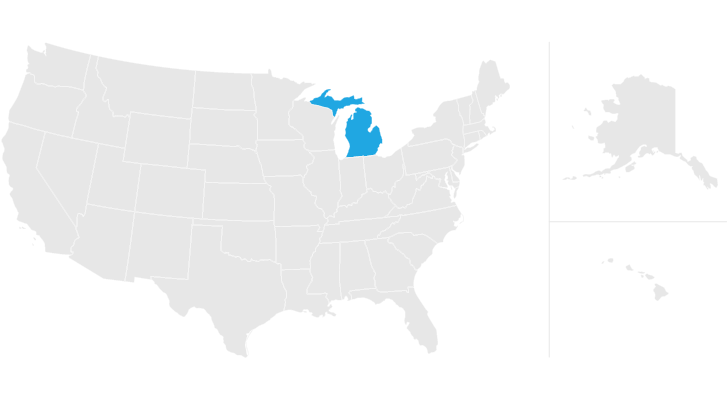
There is no estate tax in Michigan. No matter the size of your estate, you won’t owe money to the Wolverine State. You might owe taxes to the federal government through the federal estate tax, depending on the size of your estate. Whether you are planning an estate or dealing with some other financial planning situation, professional help may be a good idea. SmartAsset can help you find a financial advisor in your area who meets your individual needs.
Michigan Estate Tax
Michigan is one of 38 states that have no estate tax.
What Is the Estate Tax?
The estate tax is applied to the estate of a recently deceased person after they die but before the money is passed on to their heirs. It is sometimes referred to as the “death tax.”
The estate tax is not to be confused with the inheritance tax. That tax is applied to a person’s heirs after they have already received their inheritance.
Michigan Inheritance Tax and Gift Tax

Like the majority of states, Michigan does not have an inheritance tax. If you stand to inherit money in Michigan, you should still make sure to check the laws in the state where the person you are inheriting from lives. In Pennsylvania, for example, the inheritance tax can apply to heirs who live out of state if the descendant lives in the state.
Michigan also has no gift tax. The federal gift tax exemption is $16,000 per recipient per year in 2022 and $17,000 in 2023. If you gift more than that in a year to any single person, the amount over the exemption counts against your lifetime gift tax exemption of $12.92 million.
Federal Estate Tax
Even though there is no Michigan estate tax, you might still owe the federal estate tax. The exemption for that tax is $12.06 million in 2022 and $12.92 million in 2023. This tax is portable for married couples, meaning that with the right legal moves a married couple can protect up to $25.84 million when both spouses have died.
If an estate exceeds that amount, the top federal tax rate is 40%. A full chart of federal estate tax rates is below.
Here’s an example of how it works: Say your estate is worth $22.74 million and you aren’t married. Subtracting the exemption of $12.92 million, leaves you with a taxable estate of $9.82 million. Consulting the chart, you are in the highest bracket. Your base tax payment on the first $1 million is $345,800. You also owe 40% on the remaining $8.82 million, which comes to $3.528 million. That sum ($3.528 million), plus the base taxes of $345,800, means your total federal estate tax burden is $3.8738 million.
FEDERAL ESTATE TAX RATES
| Taxable Estate* | Base Taxes Paid | Marginal Rate | Rate Threshold** |
| $1 – $10,000 | $0 | 18% | $1 |
| $10,000 – $20,000 | $1,800 | 20% | $10,000 |
| $20,000 – $40,000 | $3,800 | 22% | $20,000 |
| $40,000 – $60,000 | $8,200 | 24% | $40,000 |
| $60,000 – $80,000 | $13,000 | 26% | $60,000 |
| $80,000 – $100,000 | $18,200 | 28% | $80,000 |
| $100,000 – $150,000 | $23,800 | 30% | $100,000 |
| $150,000 – $250,000 | $38,800 | 32% | $150,000 |
| $250,000 – $500,000 | $70,800 | 34% | $250,000 |
| $500,000 – $750,000 | $155,800 | 37% | $500,000 |
| $750,000 – $1 million | $248,300 | 39% | $750,000 |
| Over $1 million | $345,800 | 40% | $1 million |
*The taxable estate is the total above the federal exemption of $12.92 million.
**The rate threshold is the point at which the marginal estate tax rate kicks in.
Overall Michigan Tax Picture

Michigan is fairly tax-friendly for retirees. Retirement plans and pension are partially taxed and Social Security is not taxed. Michigan’s income tax rate is a flat 4.25% and local income taxes range from 0% to 2.4%. If you have a new job, you can figure out what your take home pay will be, using our Michigan paycheck calculator.
The average effective property tax rate in Michigan is 1.32%. The sales tax rate across the state is 6%.
Estate Planning Tips
- When dealing with any big financial event, it can be helpful to have the expertise of a professional financial advisor. Finding a financial advisor doesn’t have to be hard. SmartAsset’s free tool matches you with up to three vetted financial advisors who serve your area, and you can interview your advisor matches at no cost to decide which one is right for you. If you’re ready to find an advisor who can help you achieve your financial goals, get started now.
- One common estate planning mistake is to forget about certain assets. It’s not just money and investments you need to think about, but property like cars and family heirlooms, as well.
Photo credit: ©iStock.com/courtneyk, SmartAsset, ©iStock.com/wellesenterprises